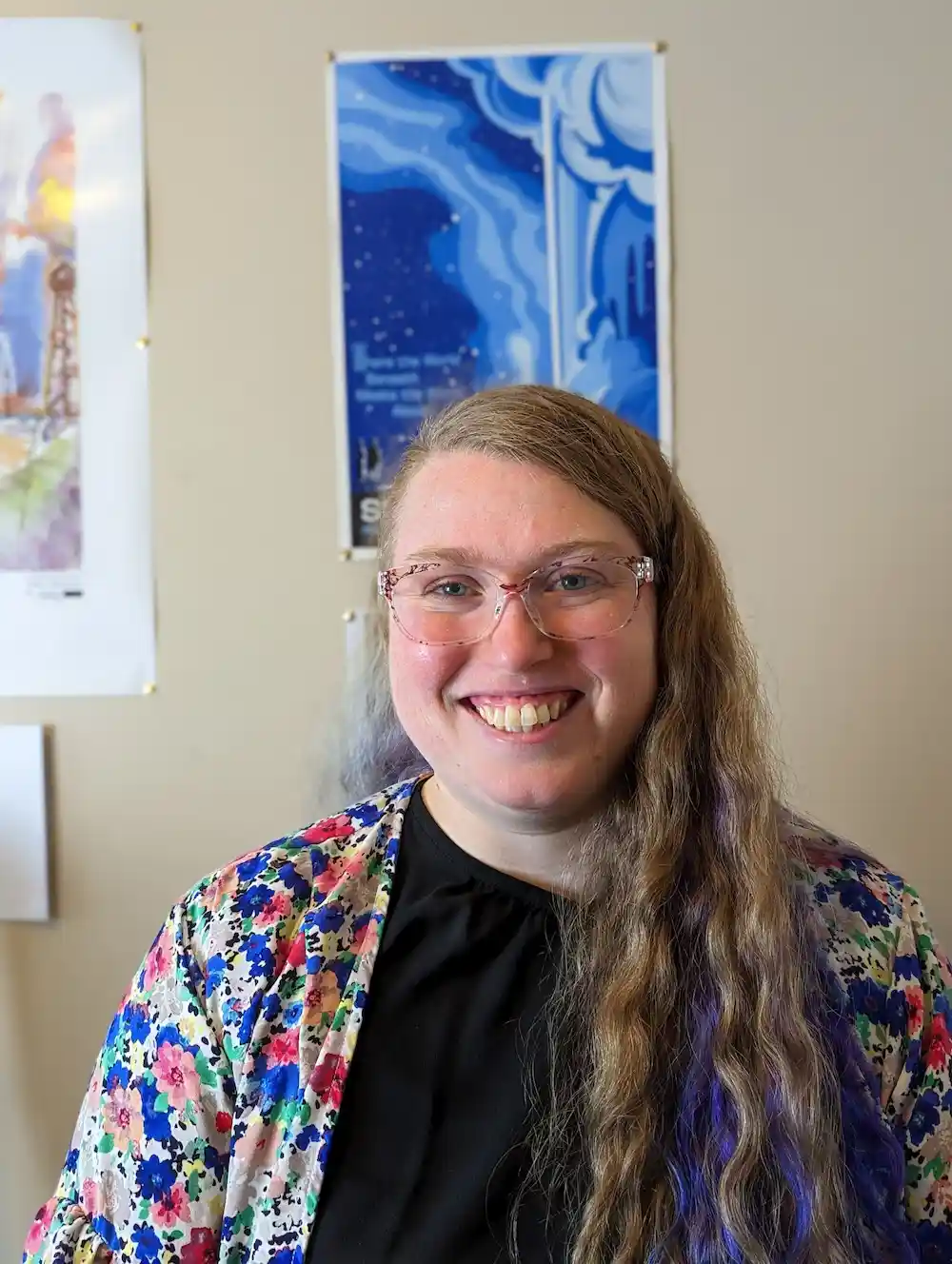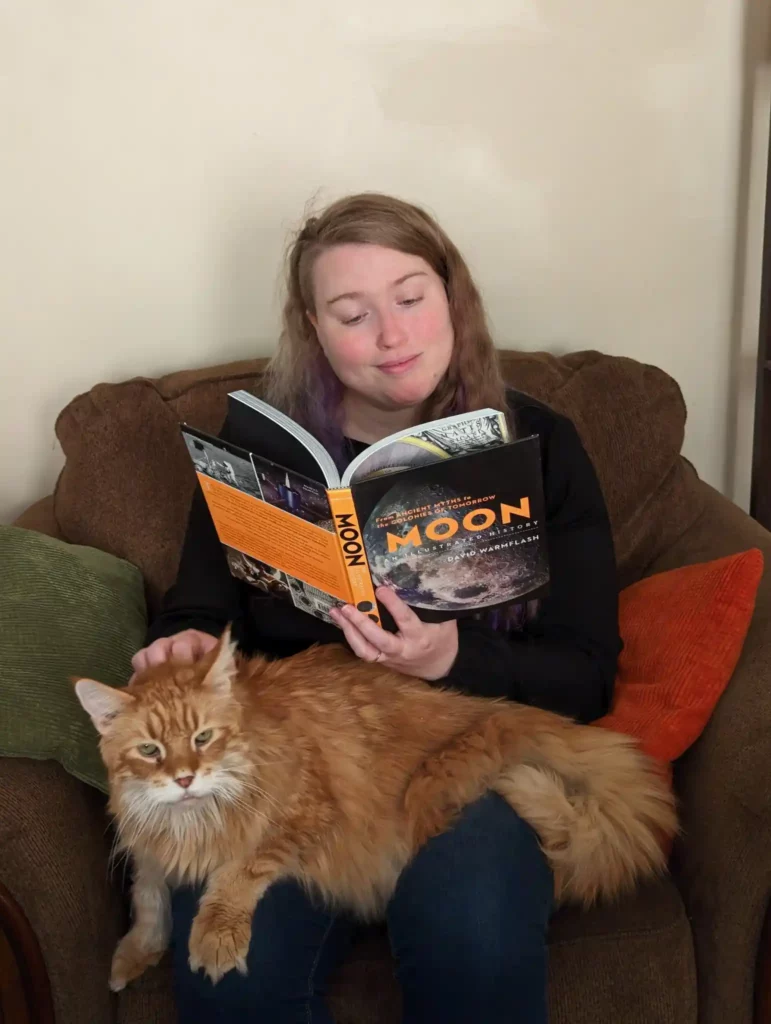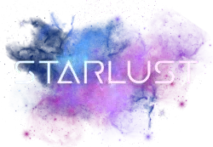
About Sarah Hoffschwelle, Senior Writer of starlust.org
Last Updated: October 13, 2023
Hello, fellow lovers of the night sky and space nerds. My fascination with astronomy sprung out of a love for science fiction in my preteens as I pondered the possibilities in the universe and what we had actually discovered, devouring science content in various forms like books, magazines, articles on the web, and social media as well as informal science experiences like at museums.
Originally from Texas, I’ve been in the Northeast for almost 8 years. While my professional career began in educational nonprofits, including museums, I realized my voice could spread further through my writing and therefore I pivoted to being a self-employed writer and contractor a few years ago on topics including astronomy, science, self-discovery, and learning as well as fiction such as short stories, poetry, and novels-in-progress.
I’ve been writing for Starlust since September 2022 and have greatly enjoyed sharing my love of space, astronomy, night sky observing, and human spaceflight with all of you.
What first inspired you to start writing about space, astronomy, and stargazing?
I started writing about space in short stories, primarily science fiction. However, my love for more technical, academic astronomy writing began in college with astronomy and physics courses for fun while pursuing my Bachelor’s in English. One course focused on explaining big concepts of astronomy and physics in simple language that anyone could understand. It was an eye-opening course that has greatly influenced all my work since.
My writing about space, astronomy, and stargazing shifted as the Director of Education at a museum focused on space and earth sciences as well as related areas such as human space exploration and general STEM. Much of my time was spent writing engaging and interesting exhibit copy, lesson plans, and science experiences for audiences of all ages.
How do you go about researching your writing on these topics?
First, I pull on my knowledge and previous work in museums first to create an outline. Then, I double-check and update my knowledge using reputable sites such as NASA/ other space agencies as well as astronomy news organizations such as Astronomy Magazine, Sky & Telescope, and Space.com. I then round this out with a general search for scientific papers and/ or recent news articles.
While I strive to make my writing as exciting and focused on storytelling as my work in museums, this dedicated audience of typically adult space lovers means I can go into many of the details that were often glossed over in favor of bigger ideas in museums. My goal is always to provide the most comprehensive and up-to-date information I can since there’s new and exciting research being performed every day.
How do you balance scientific accuracy with engaging storytelling in your writing?
I started as a writer first and foremost, creating stories pretty much as soon as I could write. That combined with my Bachelor’s in English with a focus on Creative Writing means storytelling has been a part of my whole life. I know the power of a good story to keep an audience engaged and convey various messages and lessons.
My path shifted toward the end of my college career when I took an internship at a local natural history museum. In “free-choice” learning environments, the goal is to convey information in a fun and engaging way that will appeal to audiences who have often chosen to be there versus more formal learning environments such as school.
Instead of reading out of a textbook about important people, events, and dates in history or scientific concepts, free-choice learning environments offer the chance to hear the stories behind individuals, events, and ideas in fun and engaging demonstrations, experiences, and shows. Doing this programming day after day gave me the opportunity to test methods of storytelling as well as the balance between educational content, story, and exciting demonstrations to find the best go-to options for different audiences.
Combining the programming experience in educational nonprofits with my love of writing allows me to provide a similar experience when using only words, using the vehicle of engaging storytelling to support my educational elements and scientific research.
What challenges have you faced while writing about space and how have you overcome them?
I love learning. Both educational nonprofits and scientific writing provide me with the chance to learn something new and then share that knowledge with others. There are challenges, but in general, it’s a fun challenge, like a puzzle to work out.
Since most of my experience came from museums where I had the opportunity to utilize fun and exciting materials and equipment such as a planetarium, telescopes, maker labs, and various science equipment (both formal as well as repurposed everyday items), it can very different to only use words. There’s a difference between explaining the orbits of the planets around the Sun and pulling up an animation of the solar system in the planetarium that I can manipulate to show different angles, fly close to zoom in on the planets, etc. However, it’s a fun challenge that pushes me to use my words as effectively as possible and I’ve been continually honing this craft.
This background also impacted my general knowledge about all of these topics since I always had to consider my audience. A lot of my research for astronomical and space writing focuses on providing more detail, math, and numbers than I would have used in my work at museums, which was focused on conveying big ideas in short, exciting experiments, demonstrations, and planetarium shows. This requires a shift from, for instance, “the ISS is about as big as a football field and about the size of a six-bedroom house for living and working” to an article detailing the exact dimensions of each capsule to explain how big the ISS is. This is a fun challenge that allows me to explore different focuses and areas in more detail than I have before.
Writing about space means big ideas that link to bigger ideas. There is often a massive amount of information about a specific topic, branching off into different use cases, possibilities, and research. I often find myself cutting back my research to best address the focus of the article and condense big complicated ideas into manageable focused pieces within a cohesive article. Condensing this information and understanding it before explaining it to an audience you can’t see or engage with to see if they are understanding what you are saying is a challenge, but also helps me to confirm my own understanding. It forces me to do everything I can to understand my topic and then explain it step-by-step in clear concise language to convey my meaning.

How has writing about space changed the way you view the world and our place in the universe?
Learning about space in general has greatly changed my worldview and my understanding of the universe, but writing about it has created interesting shifts. Space provides an amazing gateway to science because it is inherently cool and beautiful, enticing you to learn more.
As you learn more, you realize how little you actually know which continues your quest for knowledge. Space, in particular, makes you realize how small we all are. The struggles of any given day, week, month, or year might be enormous, but it can be comforting to know we are just:
- one species on one little terrestrial planet
- orbiting a massive ball of hot gas
- that is in turn just one of the billions of hot balls of gas
- in our Milky Way Galaxy
- which is just one of the billions of galaxies in the universe
- which has been around for billions of years
- and will be around for hundreds of trillions of years to come.
The possibilities are mind-boggling and give us a chance to put everything in perspective, especially when things are stressful.
Writing about space is a beautiful translation and transmission of ideas that makes you question your own understanding of the world numerous times and help you understand different people and perspectives. It helps you question what you know about everything as you attempt to unravel the different mysteries of the universe.
What is your favorite space-related memory or experience?
It’s hard to pick just one, but I have had two amazing experiences from my time at the museum that typically stand out in my mind.
The 2017 Total Solar Eclipse was a massive event at the museum. I was interviewed by local media outlets about it, especially regarding safe viewing practices since many reputable sellers of eclipse glasses had sold out due to the “eclipse fever” that had taken over the country in the weeks before. It was a surreal experience to talk with reporters and their audiences about this amazing event that everyone was excited about, but also wary of for various reasons. New Hampshire experienced about 80% totality and I was able to spy a few glances throughout the day in between my duties. I’m looking forward to the 2024 total eclipse where I should be able to leisurely enjoy it, and likely write it up for all of you.
Another space-related event that I still can’t believe I was a part of was when my museum was chosen for an In-flight Educational Downlink where we were able to talk in real-time with an astronaut on the ISS for about 20 minutes. While I had watched countless videos of astronauts in space showing off various parts of living and working in space, it was a very different experience to be talking back and forth with an astronaut in real time, having him answer questions that the children from our Homeschool Program had come up with and asked in front of other visitors and their families. Seeing them experience this amazing event really reinforced why I love sharing science and space with others.
You can find me and my writing at a variety of places on the web. I am currently in the process of changing over my professional identity to the name I will be publishing under, my soon-to-be married name Sarah-Marie Cooper.
